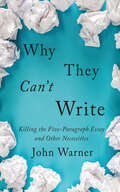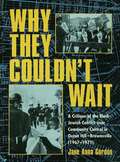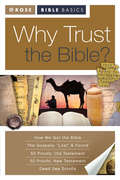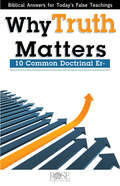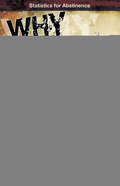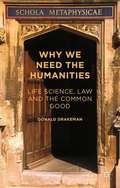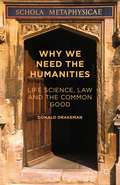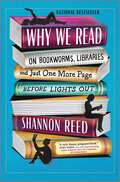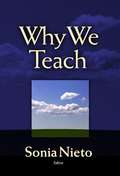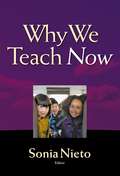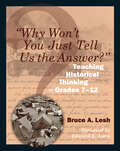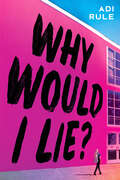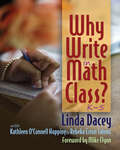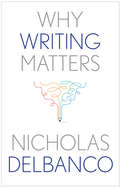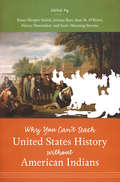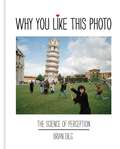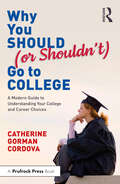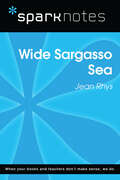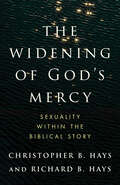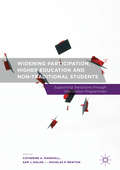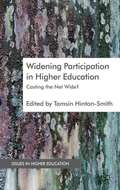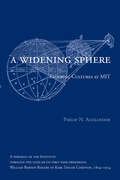- Table View
- List View
Why Theatre Matters
by Kathleen GallagherWhat makes young people care about themselves, others, their communities, and their futures? In Why Theatre Matters, Kathleen Gallagher uses the drama classroom as a window into the daily challenges of marginalized youth in Toronto, Boston, Taipei, and Lucknow. An ethnographic study which mixes quantitative and qualitative methodology in an international multi-site project, Why Theatre Matters ties together the issues of urban and arts education through the lens of student engagement. Gallagher's research presents a framework for understanding student involvement at school in the context of students' families and communities, as well as changing social, political, and economic realities around the world.Taking the reader into the classroom through the voices of the students themselves, Gallagher illustrates how creative expression through theatre can act as a rehearsal space for real, material struggles and for democratic participation. Why Theatre Matters is an invigorating challenge to the myths that surround urban youth and an impressive study of theatre's transformative potential.
Why They Can't Write: Killing the Five-Paragraph Essay and Other Necessities
by John WarnerAn important challenge to what currently masquerades as conventional wisdom regarding the teaching of writing.There seems to be widespread agreement that—when it comes to the writing skills of college students—we are in the midst of a crisis. In Why They Can't Write, John Warner, who taught writing at the college level for two decades, argues that the problem isn't caused by a lack of rigor, or smartphones, or some generational character defect. Instead, he asserts, we're teaching writing wrong. Warner blames this on decades of educational reform rooted in standardization, assessments, and accountability. We have done no more, Warner argues, than conditioned students to perform "writing-related simulations," which pass temporary muster but do little to help students develop their writing abilities. This style of teaching has made students passive and disengaged. Worse yet, it hasn't prepared them for writing in the college classroom. Rather than making choices and thinking critically, as writers must, undergraduates simply follow the rules—such as the five-paragraph essay—designed to help them pass these high-stakes assessments.In Why They Can't Write, Warner has crafted both a diagnosis for what ails us and a blueprint for fixing a broken system. Combining current knowledge of what works in teaching and learning with the most enduring philosophies of classical education, this book challenges readers to develop the skills, attitudes, knowledge, and habits of mind of strong writers.
Why They Couldn't Wait: A Critique of the Black-Jewish Conflict Over Community Control in Ocean-Hill Brownsville, 1967-1971
by Jane Anna GordonExamining the infamous conflict between a predominantly black community and a predominantly Jewish teachers' union, Gordon takes a new look at this historically rich and racially diverse community.
Why Trust the Bible?
by Rose PublishingRose Bible Basics series: Why Trust the Bible?Is the Bible an ancient document that has been tampered with? Has it been edited many times over the centuries and now is filled with errors? How can we know what the Bible really said when the originals no longer exist?Bestselling books that promote these doubts, such as Bart Ehrman's Misquoting Jesus: The Story Behind Who Changed the Bible and Why, are influencing today's news media, and these teachings are being treated as fact. Now is the time to address the topic of textual criticism in our churches and help Christians become better informed — ready to "defend the faith." "The Bible can be trusted," says author Dr. Timothy Paul Jones. The good news is that the Bible is reliable, even though it was hand copied and there are variations between texts. This ebook explains the variations and why they don’t affect the trustworthiness of the Scriptures.Dr. Jones' interest in this topic began many years ago when he came across these arguments in seminary. At first his faith was badly shaken and he wondered if he still believed. But as he dug deeper, he found answers. Dr. Jones shows the errors in critics'logic and facts —and does it in an easy-to-understand style with charts, diagrams, and explanations. This full-color ebook gives answers to the following claims by critics:•The Gospels were written long after Jesus lived by people who weren't eyewitnesses.•The stories about Jesus' life and death were not handed down reliably and not recorded accurately.•The Bible is full of textual errors, as proven by the Dead Sea Scrolls•The New Testament wasn't finalized until hundreds of years after Jesus and his disciples, so there could have been many other "Gospels" accepted and later rejected -- in addition to the four Gospels found in the Bible today.•The originals of the Bible are lost, therefore we have no way of knowing what it actually said.•The Bible was edited by people who had an "agenda" and changed many teachings.The chapter titles are How We Got the Bible; Dead Sea Scrolls; 100 Proofs for the Bible; Why Trust the Bible; 100 Prophecies Fulfilled by Jesus; and the Gospels "Lost" & Found.Full color, dozens of color photos and illustrations and charts.
Why Truth Matters: 10 Common Doctrinal Errors
by Rose PublishingWhat is truth, and how can we know? The Bible plainly reveals the errors and false teachings that Christians will be expected to identify and defend against. Learn to recognize the counterfeits through the light of God's truth. Christians often wonder why certain religious groups are called "cults" or are said to have "cultic teachings." The answer is fairly simple. The Scripture mentions 10 key Christian beliefs that cult leaders or aberrant teachers ignore or twist. You will learn each of these 10 beliefs and be able to give examples of truth vs. counterfeit teachings. The 10 Common Doctrinal Errors include: False Gospels, False Doctrine, False Gods, False Christs, False Spirits, False Prophets, False Apostles, False Teachers, False Visions, and False Miracles.
Why Wait?: 24 Reasons to Wait Until Marriage to Have Sex
by Rose PublishingWhy Wait? is a best-selling abstinence education booklet for Christians. It discusses one of the biggest challenges among teens and singles: pre-marital sexual activity. This bestselling full-color ebook presents 24 reasons--12 biblical and 12 medical and emotional--to think twice before risking health and happiness on sex outside of marriage. Emphasizing God's plan for marriage and his prohibition of sex outside of marriage, the ebook presents sobering statistics on sexually transmitted diseases (STDs) and offers sensible information that helps people make an educated decision about their lives. A Basic Abstinence Education Program for Churches, Sunday School Classes, and Youth GroupsAlthough many public school students receive sex education in school, Christians have a distinct view of the sacredness of sex that is usually not presented in a classroom setting. This Why Wait Pamphlet is a very basic abstinence education overview from a Christian stance that presents a Christian viewpoint on human sexuality in a simple 1-2 hour discussion. Many churches divide the students by gender to discuss these topics once a year, often in April or May, when public school address the issue, but it can be used any time.The reality is that many students today have experienced sexual contact already. Some have been taken advantage of. Others were pressured or coerced. Some have simply been naive. This grace-filled pamphlet also helps those who want to be assured of God's constant love and good plan no matter what they have experienced. It is never too late to treat yourself with respect and expect others to do the same.Abstinence Education from a Christian Point of ViewTeens and single adults ask themselves, Why Wait? Why does God care if I have sex? Everyone else is doing it. In fact, these many people are often surprised to discover that God does have very good reasons for us to wait for sex until marriage. The pamphlet presents 12 of God's compelling reasons to wait, but also provides ideas for those who have not, as well as an encouraging section on "second-time virginity."Abstinence Education: Medical FactsThe ebook also offers "Quick Facts from Medical Science." For instance--Did you know that:* STDs (sexually transmitted diseases) cost $8.4 billion each year to treat in the United States alone?* Two-thirds of people with STDs are less than 25 years old?God's Design: Sacredness of Sexuality Within MarriageGod's design for sexuality limits it to marriage. While that view might seem extreme these days, his plan is a wise one, allowing time for true love and tenderness to grow and have its appropriate place in life. Sexuality can be misused and abused. It belongs to mature people who are committed to one another through marriage.24 Reasons to Practice Abstinence Before Marriage* 12 Biblical reasons to wait, with verses of Scripture that inspire and encourage* 12 health and emotional reasons, including issues of pregnancy, STDs and personal regret* Nine ideas for "keeping out of trouble," such as* Group dating* Staying away from places where "making out" is encouragedBiblical Reasons for Abstinence Before Marriage3 Examples from the Why Wait Pamphlet* Having sex with a person creates a kind of "oneness" that God intended for marriage only (1 Cor. 6:16). This oneness is not just physical; it is emotional and spiritual, too. God created sensuality in a loving marriage to build intimacy and trust, and to bond the couple. * To test the commitment of the other person. Some people promise marriage just to get sex, and then they back out of their commitment. Many people have sex with people they would never marry (Proverbs 5:3-12).* The Bible says we should run away from sexually immoral situations (1 Cor. 6:18). When you feel yourself being tempted, get away!Health & Emotional Reasons for Abstinence Before Marriage3 Examples from the Why Wait Pamphlet* To avoid death by fatal sexually transmitted diseases, such as AIDS, which cause more than 18,000 deaths annually.* To increase your chance of a happy, lasting marriage. People who have sex
Why We Need the Humanities: Life Science, Law and the Common Good
by Donald DrakemanAn entrepreneur and educator highlights the surprising influence of humanities scholarship on biomedical research and civil liberties. This spirited defence urges society to support the humanities to obtain continued guidance for public policy decisions, and challenges scholars to consider how best to fulfil their role in serving the common good.
Why We Need the Humanities: Life Science, Law and the Common Good
by Donald DrakemanAn entrepreneur and educator highlights the surprising influence of humanities scholarship on biomedical research and civil liberties. This spirited defence urges society to support the humanities to obtain continued guidance for public policy decisions, and challenges scholars to consider how best to fulfil their role in serving the common good.
Why We Read: On Bookworms, Libraries, and Just One More Page Before Lights Out
by Shannon Reed*NATIONAL BESTSELLER**A Good Housekeeping Reads pick*A hilarious and incisive exploration of the joys of reading from a "beloved and wonderful writer" (George Saunders), teacher, bibliophile, and Thurber Prize SemifinalistWe read to escape, to learn, to find love, to feel seen. We read to encounter new worlds, to discover new recipes, to find connection across difference, or simply to pass a rainy afternoon. No matter the reason, books have the power to keep us safe, to challenge us, and perhaps most importantly, to make us more fully human.Shannon Reed, a longtime teacher, lifelong reader, and New Yorker contributor, gets it. With one simple goal in mind, she makes the case that we should read for pleasure above all else. In this whip-smart, laugh-out-loud-funny collection, Reed shares surprising stories from her life as a reader and the poignant ways in which books have impacted her students. From the varied novels she cherishes (Gone Girl, Their Eyes Were Watching God) to the ones she didn&’t (Tess of the d&’Urbervilles), Reed takes us on a rollicking tour through the comforting world of literature, celebrating the books we love, the readers who love them, and the ways in which literature can transform us for the better.
Why We Teach
by Sonia NietoThis book includes reflections by teachers who work in U.S. public elementary, middle, and high schools in a variety of settings ,in which they talk about their motivations for coming into teaching, and their thoughts about the profession itself.
Why We Teach Now
by Sonia Nieto<p>Why We Teach Now dares to challenge current notions of what it means to be a “highly qualified teacher” á la No Child Left Behind, and demonstrates the depth of commitment and care teachers bring to their work with students, families, and communities. This sequel to Nieto’s popular book, Why We Teach, features powerful stories of classroom teachers from across the country as they give witness to their hopes and struggles to teach our nation’s children. Why We Teach Now offers us the voices of teachers like 42-year veteran Mary Ginley, who wonders, “Why would anyone with any brains and imagination ever want to be a teacher?” She then answers her own question affirmatively, “It’s because somehow, even today, even with all the insanity, all the rules, all the poorly designed textbooks, all the directives to teach to the test, there are kids out there who need good teachers.” <p>At a time when politicians, policymakers, and philanthropists are quick to denigrate teachers’ work and arrogantly speak for the profession, Why We Teach Now offers teachers the room and respect to speak for themselves . Once again, Nieto gives teachers and those who care about education the inspiration and energy to embrace their role as advocates―a role that is vital not only for the well-being of students but also for the future of the profession and our nation.</p>
"Why Won't You Just Tell Us the Answer?": Teaching Historical Thinking in Grades 7-12
by Bruce LeshEvery major measure of students' historical understanding since 1917 has demonstrated that students do not retain, understand, or enjoy their school experiences with history. Bruce Lesh believes that this is due to the way we teach historylecture and memorization. Over the last fifteen years, Bruce has refined a method of teaching history that mirrors the process used by historians, where students are taught to ask questions of evidence and develop historical explanations. And now in his new book 'Why Won't You Just Tell Us the Answer? he shows teachers how to successfully implement his methods in the classroom. Students may think they want to be given the answer. Yet, when they are actively engaged in investigating the pastthe way professional historians dothey find that history class is not about the boring memorization of names, dates, and facts. Instead, it's challenging fun. Historical study that centers on a question, where students gather a variety of historical sources and then develop and defend their answers to that question, allows students to become actual historians immersed in an interpretive study of the past. Each chapter focuses on a key concept in understanding history and then offers a sample unit on how the concept can be taught. Readers will learn about the following:, Exploring Text, Subtext, and Context: President Theodore Roosevelt and the Panama Canal, Chronological Thinking and Causality: The Rail Strike of 1877, Multiple Perspectives: The Bonus March of 1932, Continuity and Change Over Time: Custer's Last Stand, Historical Significance: The Civil Rights Movement, Historical Empathy: The Truman-MacArthur Debate By the end of the book, teachers will have learned how to teach history via a lens of interpretive questions and interrogative evidence that allows both student and teacher to develop evidence-based answers to history's greatest questions.
Why Would I Lie?
by Adi RuleA ripped-from-the-headlines thriller about a charismatic, mysterious valedictorian . . . and the only girl brave enough to try to bring him down.Viveca North works harder and smarter -- and it'll all be worth it when she's named valedictorian and granted admission to her dream school, the elite Everett College. All her sacrifices are finally about to pay off. That is, unless the mysterious new guy at school, Jamison Sharpe, steals valedictorian out from under her. Jamison is popular, charming, and funny, and school comes easily to him. Viveca knows he can't really be all that he seems, but everyone completely dismisses her concerns. Soon, Viveca is obsessed with proving that Jamison is a fraud. But the deeper she gets into uncovering what she believes to be a web of lies and deceit, the closer her dreams come to unraveling once and for all. Is the school golden boy really lying, or is she as paranoid as everyone thinks? In this suspenseful psychological thriller Adi Rule weaves the unforgettable story of a girl who refuses to be silenced, and who won't back down from what she knows she deserves.
Why Write in Math Class?
by Linda Dacey Rebeka Eston Salemi Kathleen O'Connell HoppingTo help students communicate their mathematical thinking, many teachers have created classrooms where math talk has become a successful and joyful instructional practice. Building on that success, the ideas in Why Write in Math Class? help students construct, explore, represent, refine, connect, and reflect on mathematical ideas. Writing also provides teachers with a window into each student's thinking and informs instructional decisions.Focusing on five types of writing in math (exploratory, explanatory, argumentative, creative, and reflective), Why Write in Math Class? offers a variety of ways to integrate writing into the math class. The ideas in this book will help you make connections to what you already know about the teaching of writing within literacy instruction and build on what you've learned about the development of classroom communities that support math talk.The authors offer practical advice about how to support writing in math, as well as many specific examples of writing prompts and tasks that require high-cognitive demand. Extensive stories and samples of student work from K-5 classrooms give a vision of how writing in math class can successfully unfold.
Why Writing Matters (Why X Matters Series)
by Nicholas DelbancoDrawing lessons from writers of all ages and writing across genres, a distinguished teacher and writer reveals the enduring importance of writing for our time In this new contribution to Yale University Press&’s Why X Matters series, a distinguished writer and scholar tackles central questions of the discipline of writing. Drawing on his own experience with mentors such as John Updike, John Gardner, and James Baldwin, and in turn having taught such rising stars as Jesmyn Ward, Delbanco looks in particular at questions of influence and the contradictory, simultaneous impulses toward imitation and originality. Part memoir, part literary history, and part analysis, this unique text will resonate with students, writers, writing teachers, and bibliophiles.
Why You Can't Teach United States History without American Indians
by Nancy Shoemaker Juliana Barr Jean M. O'Brien Susan Sleeper-SmithA resource for all who teach and study history, this book illuminates the unmistakable centrality of American Indian history to the full sweep of American history. The nineteen essays gathered in this collaboratively produced volume, written by leading scholars in the field of Native American history, reflect the newest directions of the field and are organized to follow the chronological arc of the standard American history survey. Contributors reassess major events, themes, groups of historical actors, and approaches--social, cultural, military, and political--consistently demonstrating how Native American people, and questions of Native American sovereignty, have animated all the ways we consider the nation's past. The uniqueness of Indigenous history, as interwoven more fully in the American story, will challenge students to think in new ways about larger themes in U.S. history, such as settlement and colonization, economic and political power, citizenship and movements for equality, and the fundamental question of what it means to be an American.Contributors are Chris Andersen, Juliana Barr, David R. M. Beck, Jacob Betz, Paul T. Conrad, Mikal Brotnov Eckstrom, Margaret D. Jacobs, Adam Jortner, Rosalyn R. LaPier, John J. Laukaitis, K. Tsianina Lomawaima, Robert J. Miller, Mindy J. Morgan, Andrew Needham, Jean M. O'Brien, Jeffrey Ostler, Sarah M. S. Pearsall, James D. Rice, Phillip H. Round, Susan Sleeper-Smith, and Scott Manning Stevens.
Why You Like This Photo: The science of perception
by Brian DilgCombining science and photography, Brian Dilg explores the reasons behind Why You Like This Photo.
Why You Like This Photo: The science of perception
by Brian DilgCombining science and photography, Brian Dilg explores the reasons behind Why You Like This Photo.
Why You Should (or Shouldn’t) Go to College: A Modern Guide for Understanding Your College and Career Choices
by Catherine Gorman CordovaNo matter who you are or what your background might be, deciding whether or not to go to college, and which college to attend, is a complex and often stressful process. Why You Should (or Shouldn’t) Go to College is written to help you become more informed and more comfortable in your decision-making so that perhaps some of the unavoidable anxiety is reduced, your questions are answered, and you can move forward confidently toward your goal…whatever it might be.Full of easy-to-understand data and background on higher education and current economic workforce trends, this book provides an overview of the college process, including academic keywords and jargon, alternative routes, and “Student Silhouette” stories from others who have chosen a variety of paths post high school,. This book will enhance your knowledge and choices when deciding what path is right for you.Whether you are a stressed high school student trying to decide what’s next, a parent deliberating your child’s future, or a non-traditional student following your own path, this has the knowledge and information needed to make deliberate and informed choices about your future education and career choices.
Wide Sargasso Sea (SparkNotes Literature Guide Series)
by SparkNotesWide Sargasso Sea (SparkNotes Literature Guide) by Jean Rhys Making the reading experience fun! Created by Harvard students for students everywhere, SparkNotes is a new breed of study guide: smarter, better, faster. Geared to what today's students need to know, SparkNotes provides: *Chapter-by-chapter analysis *Explanations of key themes, motifs, and symbols *A review quiz and essay topicsLively and accessible, these guides are perfect for late-night studying and writing papers
The Widening of God's Mercy: Sexuality Within the Biblical Story
by Christopher B Hays Richard B HaysA fresh, deeply biblical account of God&’s expanding grace and mercy, tracing how the Bible&’s narrative points to the full inclusion of LGBTQ people in Christian communities Discussions of the Bible and human sexuality often focus on a scattered handful of specific passages. But arguments about this same set of verses have reached an impasse, two leading biblical scholars believe; these debates are missing the forest for the trees. In this learned and beautifully written book, Richard and Christopher Hays explore a more expansive way of listening to the overarching story that scripture tells. They remind us of a dynamic and gracious God who is willing to change his mind, consistently broadening his grace to include more and more people. Those who were once outsiders find themselves surprisingly embraced within the people of God, while those who sought to enforce exclusive boundaries are challenged to rethink their understanding of God&’s ways. The authors—a father and son—point out ongoing conversations within the Bible in which traditional rules, customs, and theologies are rethought. They argue that God has already gone on ahead of our debates and expanded his grace to people of different sexualities. If the Bible shows us a God who changes his mind, they say, perhaps today&’s Christians should do the same. The book begins with the authors&’ personal experiences of controversies over sexuality and closes with Richard Hays&’s epilogue reflecting on his own change of heart and mind.
Widening Participation, Higher Education and Non-Traditional Students
by Catherine A. Marshall Sam J. Nolan Douglas P. NewtonThis book highlights the problems that have developed as students lack either the social or cultural capital to take the opportunity of Higher Education through conventional routes. This might be due to leaving school early, lacking entry qualifications or wanting to further their education and prospects after entering the workplace. Foundation courses help to widen participation and create a route towards higher education. This book offers tried and tested practical solutions, from the notion of widening participation, to recruitment of students and to ways of helping them to make the most of themselves and develop the skills they need to progress on degree courses of their choice.
Widening Participation in Higher Education
by Tamsin Hinton-SmithThis collection offers an authoritative, up-to-date commentary on the challenges facing higher education today across both the UK and internationally. The book charts the impact of global economic trends and recent policy developments for students, academics, providers and changing course provision.
A Widening Sphere: Evolving Cultures at MIT
by Philip N. AlexanderHow MIT's first nine presidents helped transform the Institute from a small technical school into a major research university.MIT was founded in 1861 as a polytechnic institute in Boston's Back Bay, overshadowed by its neighbor across the Charles River, Harvard University. Harvard offered a classical education to young men of America's ruling class; the early MIT trained men (and a few women) from all parts of society as engineers for the nation's burgeoning industries. Over the years, MIT expanded its mission and ventured into other fields—pure science, social science, the humanities—and established itself in Cambridge as Harvard's enduring rival. In A Widening Sphere, Philip Alexander traces MIT's evolution from polytechnic to major research institution through the lives of its first nine presidents, exploring how the ideas, outlook, approach, and personality of each shaped the school's intellectual and social cultures. Alexander describes, among otherthings, the political skill and entrepreneurial spirit of founder and first president, William Rogers; institutional growing pains under John Runkle; Francis Walker's campaign to broaden the curriculum, especially in the social sciences, and to recruit first-rate faculty; James Crafts, whose heart lay in research, not administration; Henry Pritchett's thwarted effort to merge with Harvard (after which he decamped to the Carnegie Foundation for the Advancement of Teaching); Richard Maclaurin's successful strategy to move the institute to Cambridge, after considering other sites (including a golfclub in Brighton); the brilliant, progressive Ernest Nichols, who succumbed to chronic illness and barely held office; Samuel Stratton's push towards a global perspective; and Karl Compton's vision for a new kind of Institute—a university polarized around science and technology. Through these interlocking yet independent portraits, Alexander reveals the inner workings of a complex and dynamic community of innovators.

